#anyone else only compared to their parents in a critical manner (EXCLUSIVELY)?
Explore tagged Tumblr posts
Text
Both my parents are (separately and independently) trying to coax me into coming out to them as a lesbian and my dad is deadass begging me to read some self-help books he gave me. What an interesting situation.
#anyone else only compared to their parents in a critical manner (EXCLUSIVELY)?#let me tell you. when your father says ‘‘you’re my mirror’’ in a cautionary way. it’s really something.#my dad: you’re like me in a lot of ways. consider changing that for your own good asap#my dad: you should listen to this song you’ll like it! the singer is a lesbian btw#my mom: why are you dressing like that? DO YOU HAVE SOMETHING TO TELL ME??#my mom: why are all your friends gay? IS THERE SOMETHING YOU WANT TO TELL ME???#apparently she told my sister to ask me bc I ‘dodged the question’ when she asked me point blank (never happened)#personal
0 notes
Text
Commentary on Good Old Days through an exploration of its stories based in family.
An anthology series marked by the objects of significance for its various characters, Good Old Days explores many themes. Some major reoccurring explorations delve into chasing dreams, love, academic pressure, grief, and more. But what stood out most to me was the way the series handled very different uses of parents in their stories.
Every story was influenced greatly by the parental figures in their lives, whether it was Phu accepting his mother's death and moving on from it, Piang with her dad, Kai and Got coming to understand the generational trauma they were subjected to, or Mai being raised in a family whose expectations led to the death of her uncle.
I'll be focusing on three of the stories within the anthology. Bond and Relationship, Road to Regret, and Somewhere Only We Belong.
*A striking exclusion is likely Memory of Happiness, as Piang's dynamic with her father is quite central to the storyline. But I don't have quite as much to say on it compared to others. To be brief: I enjoy the idea it's going for (about taking on the family business and making it yours; both Piang and Jap transform what their parents did before them into their own, new versions, that are just as great as what came before) but I didn't enjoy some other parts (mainly in relation to how the series explains her dad's actions).
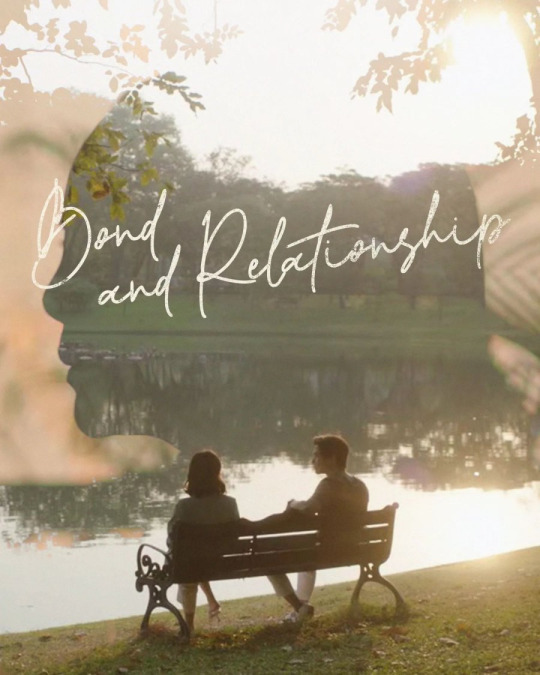
Bond and Relationship, the first story, focuses on Phu, a young man who closes himself off from creating "bonds" with people after losing his dog, Ryu, as a child. What quickly becomes apparent is that the story hopes to explore grief and the importance of finding new people.
Phu lives a solitary life, unwilling to let anyone into his life due to fear of losing them. He pushes Mint, his love interest away, and he closes himself off from caring for as long as he can. His mom, then, tries to get him to have people to lean on as best she can, because soon, she'll die of illness. In the end, Phu realizes what he was meant to learn, but loses Mint due to his unwillingness to open up. However, he takes the lesson to heart and seizes the opportunity the moment he finds someone else.
His dog, Ryu, I feel was more of an extension and prelude to the loss of Phu's mother within the context of the story. He's a gift from his mother that specifically symbolizes her care for him. In essence, losing Ryu and closing off, Phu experiences an earlier version of his mother's death.
A complication on a fairly straightforward story (in my opinion, one of the most thematically simple of the series) is Phu's status as being adopted. This is something that brings Phu to wishing to push his mother away again. It's a test of sorts on his growth, and he accepts his mother back into his heart because nothing has truly changed. His mother is still the same woman who has always loved him.
All in all, a story about losing a parent and preventing yourself from closing yourself off afterward.
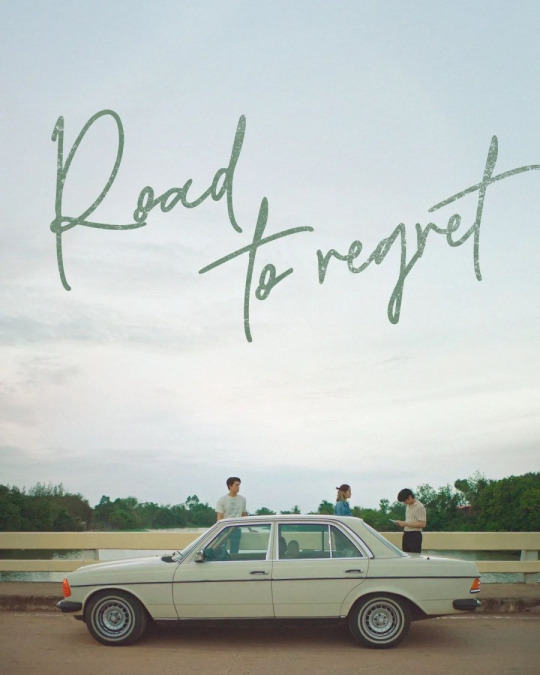
Probably the most interesting to me, Road to Regret follows three people following a mother's death. Whereas the first story of the anthology focuses mainly on the growth before the death of a mother who cared for Phu in a healthy manner, this story focuses on the aftermath of the death of a mother who deeply scarred both of her children, Kai and Got.
Both Kai and Got have issues within their personal lives, and are more prickly than any of the other protagonists in the series. Kai, notably, has a tumultuous relationship with Bomb, her ex-husband, after the business they began tomorrow went south. Got, on the other hand, is flippant about Ton's feelings for him, unsure of whether or not to get closer to him or not.
Their mother was damaging to both of them. Kai was overlooked by her mother, more harshly criticized. She always had to do more, do better, was fucking up, not trying hard enough. Got was preferred. She would put extra fish on his plate as Kai watched on then chastise him for whining, since he's a guy, saying "I'm sorry for your future wife." She took the idea of him being homosexual (which he was) negatively, denying it.
Kai is the eldest daughter. She's under pressure, the one who has to bottle it all up and clean up her mother's house after she dies. Kai is aware her mother prefers her brother, and it's the cause of a great complicated bunch of emotions within her heart. And most importantly, she doesn't want to become like her mother.
Kai, Got, and Boom get in their mother's car and drive to deliver an unsent letter from their mother to the family she left. The car was what she drove when she ran away with their dad. Both Kai and Got believe it would have been better if she had stayed there and didn't have them. When they get to their destination, you come to realize what the story is all about. Generational trauma, and how it repeats itself.
Kai's mother went through many of the feelings that Kai was made to go through. She lived in a suffocating household, suffering under the misogyny of her family. She tried to run away from it all, only for her relationship to fall apart and to emulate how she was raised with her children. She mentions how women are "already inferior" to Kai when she's younger, and how she became a failure. And Kai is terrified of becoming like her mother one day. Her mother ran away with a boy, and so did Kai. She decides to leave Bomb before he can leave her, the way her dad did to his mom. Kai does not want to be left. What she realizes at the end, though, is that it isn't leaving or being left. The two exes reconcile by the end, and it's about trying again, to make a relationship better than that of what her parents had. Got, similarly, reaches out to Ton in the end. Both of them still have issues with trusting others, and yet they find hope to try by the end.
The story comes together at the end, when Kai reads the letter. It's a letter from their mother to her family, where she expresses never having been properly loved, and not being able to do the same for her own children as a result. She saw herself as a failure in how she ended up, but was at least happy that she had gotten away from her family. The last part of the letter is their mother's last words to her, and it's confirmation she realized how she fucked up as a parent. How she didn't understand them and how she hurt them with the misery that was inside of her, but that she did wish she could have been a better parent. And honestly, the letter made me feel emotional. It's like, cathartic in many ways to see something like this. Road to Regret is emotional, and imperfect, kind of like the characters in it.
It's a story about accepting the way the trauma of your lives are passed down from the ones from generations ago, and learning from it.

The final story of the anthology, Somewhere Only We Belong follows the story of Hey and Mai. The shopkeeper, Hey has been in the entire show as a prominent character preserving the memories of our other characters. Here, we learn about why Hey is the way he is, attached to the past. He was abandoned by both of his parents to go live with his grandpa, with fake promises of coming back for him. The last gift he gets is a video game console - the one he plays consistently throughout the show.
Hey learns about the importance of objects and appreciating things around him thanks to his grandpa, who becomes the one supportive figure in Hey's life. He ends up becoming attached to his video game console, playing the same games (Harvest Moon, actually) even when he's all grown up. His mom never comes back for him. And his dad just sends him expensive gifts instead of anything else.
The other lead, Mai, is a highschooler studying to become a doctor. Her mom pressures her to maintain a 4.0 GPA and to be someone who is useful, while complaining about her brother, who is staying with them, saying he shouldn't have been born. Mai's uncle is seen as a "useless" person, as an unsuccessful online writer who "writes what he believes." He tells Mai to enjoy her life, not to push herself too much. An academically pressured kid, she's always only studying - but she begins to go to Hey's vintage game shop, as the one thing that is just for enjoyment and not related to studying.
She begins to go to the game shop after school, eliciting suspicion from her mother. And the pressure on her starts to weigh on her until she starts breaking down. And then just as her mother finds out about Mai going to the gameshop, her uncle commits suicide. It's a turning point of the story, and the way the series shows just how expectations that separate people into worthy or unworthy based on their success are harmful.
In many households, children are pressured out of finding what they actually enjoy and wish to pursue and into studying with only the goal of top grades and getting into prestigious universities. What Somewhere Only We Belong explores, here, is when it goes too far, and how it harms everyone. Hey pushes Mai away because of what he thinks is best for her, as society sees it, preventing both of them from pursuing what was growing between them.
Mai, in the end, is able to escape from the pressure brought upon her by her family. She goes to study abroad, to follow her dreams, the way she deserves to. Mai heals from what was pushed onto her, by leaving.
And then we come back to Hey, our nostalgic memory keeper, as he loses his shop and has to learn to move on from the past. What I found the best showcase of how Hey's abandonment factored into this was how he would listlessly play the console that he got as he was truly abandoned by both of his parents, stuck in the past. And when he learned to move on, to stop keeping it in his heart, he began to play new games. And it's with this that he's able to heal from the past and go after what he was once unable to, reuniting with Mai finally, and playing mobile games with her. Hey and Mai reunite with what they both love, but it's a new form of it, as they've both grown up and changed; they can start again.
#okay so this is my compromise between oh god i have thoughts and I Dont Wanna Rewatch All This Now#sou rambles#good old days#dont like what i wrote . too recap-y. but here is some thoughts#gmmtv
4 notes
·
View notes
Text
Winterfell’s Daughter. On Sansa Stark (part 3)
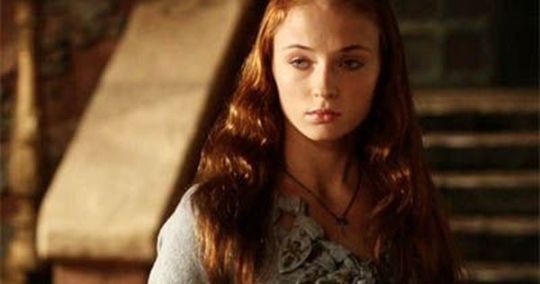
This is the third part of my analysis of the character of Sansa Stark on Game of Thrones. (Part 1, Part 2)
“WAR IS EASIER THAN DAUGHTERS”
Things are understandably tense among the Starks when they arrive in King’s Landing and Ned clumsily tries to soothe Sansa’s broken heart by giving her a fancy doll.
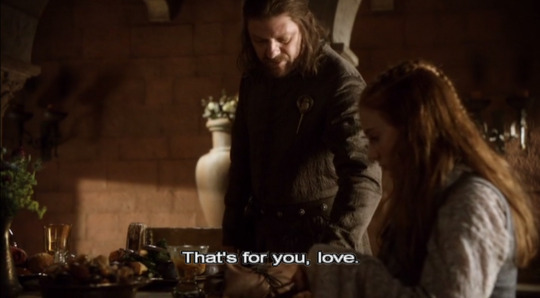
Sansa reacts by being a bit of a brat but try to look at it from her point of view: her father killed her beloved pet on the whim of the king and queen – and he gives her doll! A toy is not a replacement for a pet and Ned ought to have known that. What’s even worse is that she hasn’t played with dolls for a while and Ned doesn’t even know that. It is such a heartbreaking scene because it highlights how little Ned actually knows his eldest daughter. After Sansa has left, he makes a rueful remark to Septa Mordane about “war being easier than daughters” but that isn’t quite true, which the next scene exemplifies: Here, Ned goes to talk to Arya, explaining things and telling her that KL is a dangerous place and that the Starks have to stick together:
Ned: Sansa was dragged before the king and queen and asked to call the prince a liar.
Arya: So was I. He is a liar!
Ned: Shh darling, listen to me. Sansa will be married to Joffrey someday. She cannot betray him. She must take his side even when he’s wrong.
Arya: But how can you let her marry someone like that?
Notice that Ned has NO answer to Arya’s question! He is effectively shamed into silence by his 11 year-old daughter because he has no good answer as to why he has allowed the betrothal to stand after what happened on the King’s Road. Even when he knows that Joffrey is a vicious little shit, he still intends for Sansa to marry him. It is only when he falls out with Robert in ep06 that he finally wants to break the betrothal. I know it is unpopular to criticize the sainted Ned Stark, but as a parent, he fails Sansa. Firstly, he allows his fondness for Robert to blind him and he uncritically accepts a betrothal when Robert suggests it in an off-handed manner in the crypts of WF. Secondly, he lets the betrothal stand even after he suspects the Lannisters of murder, even after he learns Joffrey’s true nature. You might say that he cannot go against the king but that is not true. He adamantly opposes Robert, and rightly so, when he wants to have Daenerys assassinated. However, he never goes against Robert when it comes to Sansa - not when her wolf is to be killed and not about whether her future marriage is in her best interest – not until he cannot be blind to Robert’s faults any longer.
I want to go back to Ned’s comment about “war being easier than daughters”. As already noted he doesn’t seem to have any problems relating to Arya and he makes the effort to explain things to her and warn her that King’s Landing is a dangerous place. He makes no such effort with Sansa; he simply leaves her in the care of her septa. Never once does he try to temper her naïve romanticism and his interactions with her are superficial, and that is so very sad because Ned and Sansa actually share many similar character traits. No one tries to temper Sansa’s naivety with the truth – in fact, several people actively try to reinforce her romantic blinders – and thus she is eventually forced to finally face the truth in the most brutal and traumatic manner possible.
I have a lot of thoughts and feelings about the relationship between Ned and Sansa. Suffice it to say, that several factors may have been in play to create a situation where Ned doesn’t really know his daughter and instead of dealing with his unease, he buries his head in the sand and lets someone else deal with her. Gender is definitely a major factor here. I have already noted how Sansa inhabits an exclusively feminine space that Ned isn’t comfortable with. One of the reasons he relates so well with Arya is that she’s a tomboy who likes the masculine pursuits that falls within Ned’s purview as a parent and as a lord. Furthermore, Sansa has always been an obedient child and that may have led to her being a bit overlooked in a large family because she didn’t need special attention.
TRAPPED BY THE PATRIARCHAL ORDER
One of the scenes from season 1 that I find the most interesting is the scene where Sansa and Septa Mordane before the Iron Throne, discussing Sansa’s future as Queen Consort. Here Sansa demonstrates that she actually does know that being queen isn’t all sunshine and rainbows. This scene also establishes that she doesn’t really have anyone to confide in – someone who’ll take her worries seriously.
(video, timestamp: 18:16)
youtube
Septa M: Someday your husband will sit there (IT) and you will sit by his side.
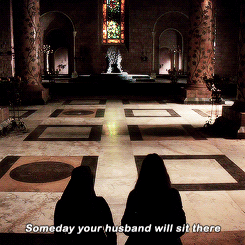
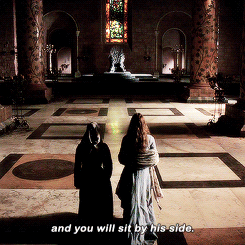
Septa M: And you will present your son to the court. All the lords of Westeros will gather here to see the little prince.
Sansa: What if I have a girl?
Septa M: Gods be good, you’ll have boys and girls and plenty of them.
Sansa: What if I only have girls?
Septa M: I wouldn’t worry about that.
Sansa: Jeyne Poole’s mother had five children – all of them girls.
Septa M: Yes, but that is highly unlikely.
Sansa: But what if?
Septa M: Well, if you only had girls, I suppose the throne would pass to Prince Joffrey’s little brother.
Sansa: And everyone would hate me.
Septa M: Nobody could ever hate you.
Sansa: Joffrey does.
Septa M: Nonsense. Why would you say such a thing? That business with the wolves? I’ve told you a hundred times – a direwolf is not…
Sansa: Please shut up about it…
[…]
Sansa: My grandfather and uncle were murdered here, weren’t they?
Septa M: They were killed on the orders of King Aerys, commonly known as the Mad King.
Sansa: Why were they killed?
Septa M: You should speak to your father about these matters.
Sansa: I don’t want to speak to my father, ever.
Septa M: Sansa, you will find it in your heart to forgive your father.
Sansa: No, I won’t.
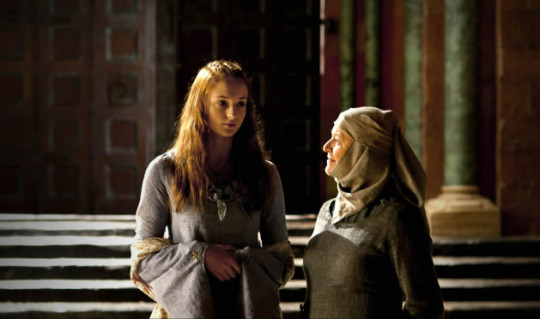
Let’s unpack this exchange because there are two very important things going on here:
Firstly, Sansa knows that as queen her most important job is to produce a male heir for the throne – and she knows that she has absolutely no control over whether she’ll birth boys or girls. It is a real and legitimate worry on her part. How does her septa respond to those worries? She brushes them off? Sansa has to press her again and again to even acknowledge that her future may not be so bright after all – even if she is to be queen. Sansa also knows that she will be the one blamed if she doesn’t produce a son – because that is how patriarchy works. Once again the septa brushes away her worries and fears as insignificant.
Secondly, there’s the issue of Joffrey. Sansa states that he hates her. She’s actually quite perceptive but once again the septa denies both Sansa’s experience and her worries – she actively tries to dissuade Sansa from trusting her own instincts! Furthermore, she goes on to dismiss Sansa’s feelings about the loss of Lady and berates her anger against her father. Sansa speaks from a place of hurt but the person responsible for her well-being won’t even address her feelings. Septa Mordane doesn’t want to talk about the unpleasant aspects of life with Sansa and refers her to her father, who hardly interacts with his daughter in a meaningful manner.
Notice how the adults responsible for Sansa either ignore, dismiss or invalidate her feelings, worries and fears!
It is no wonder that she lets herself be convinced that what she perceives and feels are wrong – and that Joffrey and Cersei are not the vicious and petty people that she experienced on the King’s Road. Sansa’s tendency to block out or re-write her experiences and perceptions can thus be understood as a coping mechanism. She’s trapped in a situation (her betrothal to Joffrey) that has turned sour and no one will listen to her and take her worries seriously.
Ned and Septa Mordane probably act out of a misguided desire to shield her but it does her more harm than good. Like the septa, Ned doesn’t really address Sansa’s feelings of loss and anger when it comes to Lady. He clumsily tries to give her a doll but a toy is a poor replacement for a beloved pet. He doesn’t even try to talk with her. Yes, she is a bit rude and standoffish but he doesn’t try and his behavior is thrown into sharp contrast when it is compared with how he interacts with Arya. Sansa is left alone with her hurt, her fears and her questions because the adults in her life won’t talk to her about difficult and unpleasant things.
You get the feeling that Sansa exists on the periphery of Ned’s life. She’s a girl so her education has primarily been entrusted to her mother and the septa. She’s an obedient child so she generally doesn’t need special attention. Yet when she does need special attention, Ned utterly fails her. However, in the end he does sacrifice his precious honour to save her life. That at least is something. Maybe Ned couldn’t really refuse Robert’s offer of a betrothal but neither he nor Cat talk seriously with Sansa about what her future entails. She is simply left to her own devices or in the care of a woman who constantly invalidates her legitimate fears and worries. Apparently, it is far easier for all the adults to leave Sansa to seek refuge in her romantic fantasies. She’s less troublesome that way.
To be continued...
206 notes
·
View notes